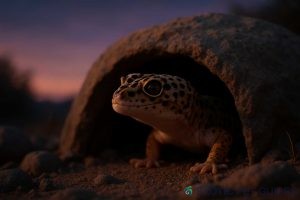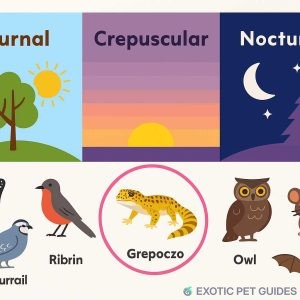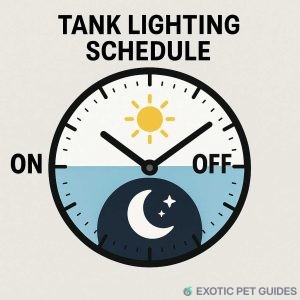🦎 Introduction
Ever wonder why your leopard gecko hides all day and only comes out at night?
You’re not alone! Many first-time owners worry their gecko is “lazy” or “uninterested.” But in reality, leopard geckos are just being themselves—and understanding their natural rhythm can help you care for them better.

🌗 Yes, Leopard Geckos Are Nocturnal (Technically)
Leopard geckos are crepuscular, which means they’re most active at dawn and dusk. However, many keepers (and sources) still refer to them as nocturnal, because:
- They hide during the day
- They hunt and explore at night
- Their eyes are adapted for low-light vision

🧠 Why It Matters for You (the Owner)
Knowing your gecko’s rhythm helps you:
- Feed at the right time
- Handle when they’re most alert
- Avoid disrupting their sleep cycle
- Set proper lighting schedules
🍽️ Best Time to Feed Leopard Geckos
Feed your gecko after sunset, around 6–9 PM, when:
- It starts exploring the tank
- Its body is warm from the heat mat
- It’s naturally ready to hunt
✅ This mimics wild behavior and improves appetite.
💡 Lighting & Darkness Schedule
Even though they’re nocturnal, leopard geckos still need a day-night cycle. Use a timer to simulate nature:
- Lights ON: 12 hours (e.g., 8 AM – 8 PM)
- Lights OFF: 12 hours (e.g., 8 PM – 8 AM)
You don’t need bright lights, but gentle ambient lighting helps regulate behavior.

🛌 Sleep Behavior: What’s Normal?
During the day, leopard geckos will:
- Stay hidden in a warm or cool hide
- Close their eyes and appear inactive
- Occasionally come out to shift position or bask
They are not sick—just sleeping.
🧴 What If My Gecko Is Active During the Day?
Occasional daytime activity is okay. But if your gecko:
- Is pacing the tank constantly
- Refuses to hide
- Tries to climb the glass repeatedly
…it may be stressed due to:
- Improper temperature
- Lighting that’s too bright
- Loud daytime environment
✅ Double-check heat and lighting setup.
🕯️ Do They Need UVB at Night?
No. UVB lighting should be turned off at night. Continuous light exposure can:
- Disrupt sleep
- Cause stress
- Reduce immune function
Use red/blue night bulbs only if observing behavior briefly (and sparingly).
🐾 Conclusion
Leopard geckos are low-light reptiles that thrive in dim, calm conditions. By respecting their natural rhythm, you’ll:
- Build trust faster
- Improve feeding response
- Create a healthier, less stressed gecko
Remember: Just because they sleep all day doesn’t mean they’re boring—it just means you’re diurnal and they’re crepuscular. 🦎🌙